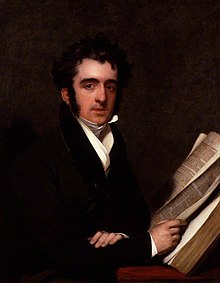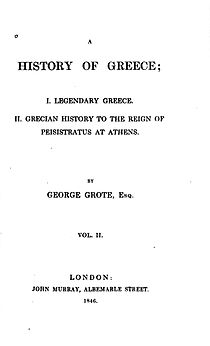George Grote
George Grote | |
|---|---|
 Portrait by Thomas Stewardson, 1824 | |
| Born | 14 November 1794 Clay Hill, Kent |
| Died | 18 June 1871 (aged 76) Mayfair, London |
| Nationality | English |
| Signature | |
George Grote (/ɡroʊt/; 17 November 1794 – 18 June 1871) was an English political radical and classical historian. He is now best known for his major work, the voluminous History of Greece.
Early life
George Grote was born at
Educated at first by his mother, George Grote was sent to
Work and writing

Meanwhile, Grote had finally decided his philosophic and political attitude. In 1817 he came under the influence of
Mrs Grote claimed to have first suggested the History of Greece in 1823; but the book was already in preparation in 1822. In April 1826 Grote published in
He went abroad in 1830, and spent some months in Paris with the Liberal leaders. Recalled by his father's death (6 July), he became manager of the bank, and took a leading position among the City Radicals.[7] In 1831 he published his important Essentials of Parliamentary Reform (an elaboration of his previous "Statement"), and, after refusing to stand as parliamentary candidate for the City of London in 1831, changed his mind and was elected head of the poll, with three other Liberals, in December 1832. As an MP, Grote spent much of his time unsuccessfully advocating for the secret ballot.[8] After serving in three parliaments, he resigned in 1841, by which time his party ("the Philosophical Radicals") had dwindled away.[2]

During these years of active public life, his interest in
In 1856, Grote began to prepare his works on Plato and Aristotle. Plato and the Other Companions of Sokrates (3 vols.) appeared in 1865. That work made him known by some as "the greatest nineteenth-century Plato scholar".[10] The work on Aristotle he did not complete. He had finished the Organon and was about to deal with the metaphysical and physical treatises when he died at his home in Mayfair, London, and was buried in Westminster Abbey.[2] The house, No. 12 Savile Row, now has a commemorative brown plaque on it.[11]
He is said, in some estimations, to have been a man of strong character and self-control, unfailing courtesy and unswerving devotion to what he considered the best interests of the nation.
Principal works
- 1821 – Statement of the Question of Parliamentary Reform
- 1822 – Analysis of the Influence of Natural Religion on the Temporal Happiness, of Mankind (From Jeremy Bentham's notes)[12]
- 1831 – Essentials of Parliamentary Reform[13]
- 1831 – Speech of George Grote, Esq. M.P., delivered April 25th, 1833, in the House of Commons, on moving for the introduction of the vote by ballot at elections
- 1846–1856 – A History of Greece; from the Earliest Period to the Close of the Generation Contemporary with Alexander the Great (12 vols.)[14][15][16][17][18][19][20][21][22][23][24]
- 1847 – Seven Letters on the Recent Politics of Switzerland[25]
- 1859 – Life, Teachings, and Death of Socrates. From Grote's History of Greece
- 1860 – Plato's Doctrine Respecting the Rotation of the Earth, and Aristotle's Comment upon that Doctrine.
- 1865 – Plato, and the Other Companions of Sokrates (3 vols.). 2nd edition, 1867; 3rd edition in 4 volumes with some re-organisation, 1885.[26]
- 1868 – Review of the Work of Mr. John Stuart Mill Entitled 'Examination of Sir William Hamilton's philosophy' [27]
- 1872 – Poems, 1815–1823
- 1872 – Aristotle (ed. by Alexander Bain and George Croom Robertson).[28][29] A 2nd edition with some extra material but in one volume was published in 1880.
- 1873 – The Minor Works of George Grote[30]
- 1876 – Fragments on Ethical Subjects, a Selection from his Posthumous Papers[31]
Recognition
The
Grote Street, a principal business strip in the city of Adelaide, South Australia was named for him.[33]
Notes
- ^ "George Grote", Quarterly Review, 135: 101, 1873
- ^ a b c d e f g Mitchell 1911, p. 619.
- ^ a b Robertson, George Croom (1890). . In Stephen, Leslie; Lee, Sidney (eds.). Dictionary of National Biography. Vol. 23. London: Smith, Elder & Co.
- ^ Grote, Harriet (1873), The Personal Life of George Grote, London: John Murray
- ^ "The Terriss Tragedy", New York Dramatic Mirror, 21 December 1897
- ^ a b Grote, George (1846). A History of Greece: I. Legendary Greece II. Grecian History to the Reign of Peisistratus at Athens. Vol. II. London: John Murray. Retrieved 14 October 2017 – via Internet Archive.
- ^ Kinzer, Bruce (2004), "George Grote, the Philosophical Radical and Politician", Brill's Companion to George Grote and the Classical Tradition, London: Brill, pp. 16–45
- ^ Kinzer, Bruce (2004), "George Grote, the Philosophical Radical and Politician", Brill's Companion to George Grote and the Classical Tradition, London: Brill, pp. 16–45, esp. 37-44
- ^ "Book of Members, 1780–2010: Chapter G" (PDF). American Academy of Arts and Sciences. Retrieved 15 September 2016.
- ^ Schofield, M. (1998–2002), "Plato", in Craig, E (ed.), Routledge Encyclopedia of Philosophy, Routledge
- ^ George Grote Plaque, English Heritage, retrieved 24 November 2013
- ISBN 9780598828064
- ^ Grote, George (1831), Essentials of parliamentary reform, London: Baldwin and Gradock
- ISBN 978-1-108-00951-5
- ^ "Review of A History of Greece by George Grote, Vols. I and II". The Athenæum: 309–11. 28 March 1846.
- ^ "Review of A History of Greece: 1. Legendary Greece; 2. Grecian History to the Reign of Peisistratus at Athens by George Grote". The Quarterly Review. 78: 113–144. June 1846.
- ^ "Review of History of Greece by George Grote, Vols. III and IV". The Athenæum: 509–10. 15 May 1847.
- ^ "Review of History of Greece, Vols. III–VIII by George Grote". The Quarterly Review. 86: 384–415. March 1850.
- ^ "Review of History of Greece by George Grote, Vols. V and VI". The Athenæum: 136–37. 10 February 1849.
- ^ "Review of History of Greece by George Grote, Vols. VII and VIII". The Athenæum: 279–81. 16 March 1850.
- ^ "Review of History of Greece by George Grote, vols. vii & viii". The Quarterly Review. 88: 41–68. December 1850.
- ^ "Review of History of Greece by George Grote, Vol. XI". The Athenæum: 673–74. 4 June 1853.
- ^ "Review: History of Greece by George Grote, Vol. XII". The Athenæum: 295–96. 8 March 1856.
- ^ "Review of A History of Greece by George Grote, 12 vols". The Quarterly Review. 99: 60–105. June 1856.
- ^ Grote, George (1876), Seven letters concerning the politics of Switzerland, pending the outbreak of the civil war in 1847, London: John Murry
- ^ Grote, George (7 August 2012) [1885], Plato and the Other Companions of Sokrates, vol. 1 (4 volumes, 3rd ed.), Project Gutenberg
- ^ George, Grote (1868), Review of the work of Mr. John Stuart Mill, entitled, 'Examination of Sir William Hamilton's philosophy'
- ^ Aristotle (ed. by Alexander Bain and George Croom Robertson), volumes 1 and 2
- ^ Bywater, I. (15 November 1872). "Review of Aristotle by George Grote, edited by Alexander Bain and G. Croom Robertson". The Academy. 3: 431–33.
- ^ Grote, George; Bain, Alexander (1873), The minor works of George Grote. With critical remarks on his intellectual character, writings and speeches, London: J. Murray
- ^ Grote, George (1876), Fragments on ethical subjects, a selection from his posthumous papers, London: J. Murray
- ^ George Grote Prize in Ancient History, retrieved 13 March 2018
- ^ "The Founding of South Australia", The Advertiser, Adelaide: National Library of Australia, p. 11, 28 December 1928, retrieved 3 June 2015
References
- "Grote, George." British Authors of the Nineteenth Century. H.C. Wilson Company, New York, 1936.
Attribution:
- This article incorporates text from a publication now in the public domain: Mitchell, John Malcolm (1911). "Grote, George". In Chisholm, Hugh (ed.). Encyclopædia Britannica. Vol. 12 (11th ed.). Cambridge University Press. pp. 619–620. This includes a detailed contemporaneous analysis of his career and works.
Further reading
- Calder, William M., ed. (1996). George Grote Reconsidered: A 200th Birthday Celebration. Hildesheim: Weidmann. ISBN 3-615-00180-X.
- Clarke, Martin L. (1962). George Grote: A Biography. London: Athlone Press.
- Davies, James (1873). "George Grote," The Contemporary Review, Vol. 22, pp. 393–411.
- Demetriou, Kyriacos N. (1999). George Grote on Plato and Athenian Democracy, a Study in Classical Reception. Frankfurt am Main; Berlin; Bern; Bruxelles; New York; Wien: Lang. ISBN 0-8204-3554-6
- Dow, Elizabeth Flagg (1956). "George Grote, Historian of Greece: Some Notes for the Centennial", The Classical Journal, Vol. 51, No. 5, pp. 211–19.
- Hamburger, Joseph (1965). Intellectuals in Politics: John Stuart Mill and the Philosophical Radicals. New Haven: Yale University Press.
- Johnson, W. (1994). "Edward Gibbon and George Grote: A Bicentenary in Common", Notes and Records of the Royal Society of London, Vol. 48, No. 2, pp. 221–26.
- Jones, Tom B. (1935). "George Grote and His History of Greece", The Classical Weekly, Vol. 29, No. 8, pp. 59–61.
- "Modern Historians," Part II, The British Controversialist, Vol. 1, 1869, pp. 1–19, 161–86.
- Momigliano, Arnaldo (1952). George Grote and the Study of Greek History. London: H. K. Lewis & Co. Ltd.
- Robertson, G. Croom (1890). "George Grote". Dictionary of National Biography. Vol. XXIII. New York: Macmillan & Co. pp. 284–93.
- Stephen, Leslie (1900). "George Grote". The English Utilitarians. Vol. III (John Stuart Mill). London: Duckworth & Co. pp. 336–44.
- Thomas, William (1979). "George Grote and the Ballot." In: The Philosophic Radicals: Nine Studies in Theory and Practice, 1817–1841. Oxford: Clarendon Press.
- Tritle, Lawrence (1999). "The Athens of George Grote: Historiography and Philosophic Radicalism." In: Text and Tradition: Studies in Greek History and Historiography. Claremont, California: Regina Books.
- Whedbee, Karen E. (2004). "Reclaiming Rhetorical Democracy: George Grote's Defense of Cleon and the Athenian Demagogues", Rhetoric Society Quarterly, Vol. 34, No. 4, pp. 71–95.
- Whedbee, Karen E. (2005). "Authority and Critical Reason: George Grote's Defense of Democratic Justice." Victorians Institute Journal, Vol. 33, pp. 97–115.
External links
- Works by George Grote at Project Gutenberg
- Works by or about George Grote at Internet Archive
- Works by George Grote at Hathi Trust
- Library of George Grote held at Senate House Library, University of London
- "MR. GROTE (Obituary Notice, Monday, June 19, 1871)". Eminent Persons: Biographies reprinted from The Times. Vol. I (1870-1875). London: Macmillan and Co. 1892. pp. 37–42. . Retrieved 13 February 2019 – via HathiTrust.
- Portraits of George Grote at the National Portrait Gallery, London
- George Grote at Find a Grave
- Hutchinson, John (1892). . Men of Kent and Kentishmen (Subscription ed.). Canterbury: Cross & Jackman. pp. 57–58.
